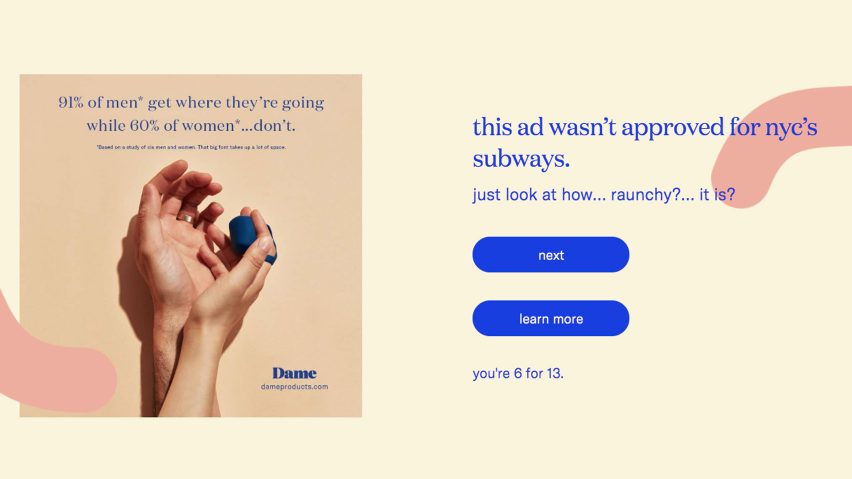Sex-toy designers Polly Rodriguez and Alexandra Fine have launched a campaign to raise awareness about the bias selection process of adverts, which "plagues" female-focused sexual wellness companies.
The Approved, Not Approved campaign and online quiz aims to help the public understand how ad guidelines are "selectively enforced" when it comes to sex-related content – particularly those targeted at women.
It includes examples from social platforms such as Facebook, Instagram and Pinterest, as well as print advertising on public transport carriers.
The duo believe that this limits consumers' access to solutions, education, and engagement from and with brands that are offering sex-related products for cis and trans women.
"Representation and visibility matter," Rodriguez told Dezeen. "When we continue to see a singular narrative of human sexuality – that of those with penises – we validate only 50 per cent of the population's existence."
"Womxn, femme, non-binary, and trans women should see themselves reflected in our media and know that they, too, deserve pleasure," she added.
Rodriguez and Fine hope that bringing this issue to light will urge policy makers to modify current guidelines that specifically "plague" female-focused wellness brands like their own.
Both women are co-founders of sexual wellness companies which sell female-focused sex toys, Rodriguez at Unbound and Fine at Dame Products.
"The current advertising landscape privileges the experiences and problems of cis men for reasons that are neither clear nor consistent – for example, erectile disfunction medications," Fine added.
"This inequality further handicaps vulva-havers, who already grapple with higher medical costs, and a poor scientific understanding of their reproductive and sexual health."
"According to the World Health Organization and Centers for Disease Control and Prevention, there is no clear or meaningful distinction between sexual health and sexual pleasure," she continued.
"Healthy, safe sex is and should be pleasurable, and the pursuit and discussion of that pleasure is a vital component of our overall health and quality of life."
Rodriguez and Fine decided to launch Approved, Not Approved after struggling to advertise their products on public transport in the US, and on social media platforms such as Facebook, Pinterest, and Instagram.
Adverts for both Unbound's Palma sex toy disguised as a ring and Dame's compact Fin vibrator were rejected due to being "phallic in nature" or "sexually explicit".
"At the same time, we noticed other brands, some of which fit into the category of 'family planning', were using clearly phallic and sexually explicit images in their advertisements, yet being approved to post their ads on these platforms," said Rodriguez.
After noticing a "clear bias", the duo decided to find a way to see which ads would be accepted or rejected if it were up to members of the public.
The result was a quiz-based website that presents concrete examples of ads that have been approved or not approved, and asks viewers to share their own feelings towards them, before showing them what the policy makers decided.
"This makes it plain and clear how ad policy has diverged from our collective common sense," said Fine.
"It's one thing to protect children from porny imagery, but the reality is more restrictive and less principled than people realise."
Website designer and Dame Products' art director Emma Olswing explained how she wanted to create a simple yet playful and dynamic visual identity that would clearly convey the initiative's message.
She used the same typeface as the Dame logo and the company's blue branding, before adding subtle graphic animated background elements and button animations.
Rodriguez and Fine hope to collect enough data from the quiz-style site to be able to show policy makers that the confusion caused by the rejection of certain ads doesn't come solely from the brands directly affected by these regulations, but from their audiences too.
According to the pair, these bias regulations hugely impact the female sexual wellness industry, as there are very few instances of sex products for women being brought into mainstream culture.
"Advertising is a necessary and important part of connecting people to valuable solutions," said Fine. "There are millions of people who stand to improve their lives with our products, and they will have no idea we exist until we're allowed to make contact with them."
"This doesn't just impact a few businesses – it impacts the health and happiness of everyone who has sex," she added.
"Viagra was advertised everywhere – a former presidential candidate (Bob Dole) was the spokesperson – and as a result, we've been conditioned that male sexual wellness is a normal health issue, but for everyone else it's 'inappropriate' and 'taboo'."

